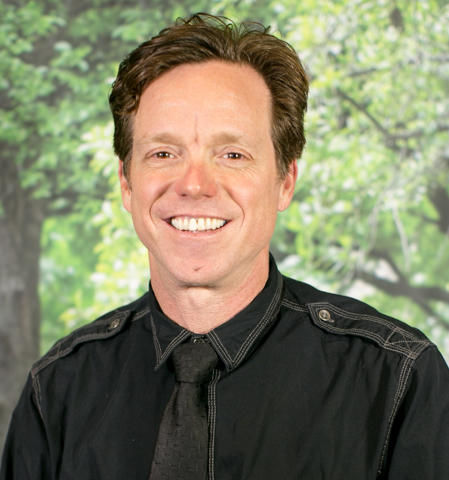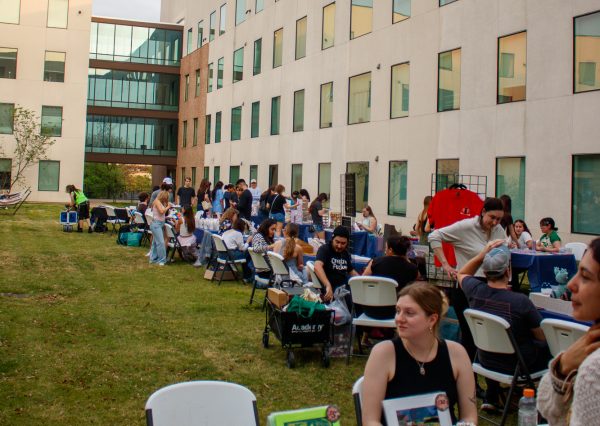Education Professor engages in dialogue on toxic societal gender roles

Professor Sloan is head of Social Justice LLC.
Kris Sloan is an associate professor in the School of Education at St. Edward’s University and director of the university’s Social Justice Living Learning Community. Sloan teaches courses on culture, curriculum, educational policy and assessment. As director of the Social Justice Living Learning Community, Sloan engages in a number of scholarly events with students and faculty alike. Sloan routinely facilitates discussions regarding relevant social justice issues. A few of Sloan’s recent endeavors include sponsoring organizations such as the Men’s Initiative and Men Against Violence, groups that aim to explore masculinity, imbalanced power structures and prevention of sexual harassment toward women. Sloan has taken initiative to educate individuals on the hazards of toxic social trends and societal perception of sexual violence.
Sloan recently spoke with student journalist Gianni Zorrilla. Edited excerpts follow:
Gianni Zorrilla: Why is educating the public, specifically men and boys, on issues of sexual harassment and assault more important and relevant than ever?
Kris Sloan: Most every societal problem that exists around sexual violence all grows out of crisis’ in masculinity; however, we do not talk about it that way. Most of these problems are de-gendered. Feminists have been talking about these issues forever, so anything that we say is not anything that a woman hasn’t already said. The conversation that has to be had is what is going on in the socialization of young boys and men, that in turn leads to these larger societal inequalities.
Zorrilla: In your opinion piece with the Austin American-Statesman, you mention the “cultural crossroads” among the interpersonal relationships of men and women. What do you think provoked this recent phenomenon?
Sloan: This calls to question: “Had Hillary Clinton won the election, and there not have been a women’s march on the day following the inauguration, would all this have happened?” To tell you the truth, I think that was a cultural awakening. We have a clearly abusive and misogynistic man denigrating women in all sorts of ways. It has caused divisions around this rupture of what is allowable and how to treat women. I’d like to think that there are lots of cultural forces at play that led us to this moment, but I think that the match that lit the fuse was the election. The African-American woman who founded #MeToo started it before the election, so clearly there was cultural presence beforehand. Historically, all of the movements (Civil Rights, LGBTQ, Women’s Rights, etc.) have produced massive gains for those fighting. I would say that most people, men in particular, have learned to have more expansive roles in improving these issues. Yes, a lot has improved, but clearly there is a segment of our male population that somehow feels as if they are being attacked, or that these gains have come at their expense or that they are losing position in the midst of it. It is kind of a state of anxiety. The #MeToo movement is part of a long reaction of the grip of patriarchy loosening on our society and all cultural institutions. Again, the match, being the election, lit the fuse. It’s always been there—micro movements here, micro movements there—but I really do think that this opened the door to having wider conversations about it.
Zorrilla: What do you think about the fact that it takes large media-backed movements like #MeToo for such issues to gain traction?
Sloan: I would first say social media rather than media, because I think the rise in power of social media, especially Twitter and the hashtag, is when all of these women figured out that they were not the only ones. The media essentially picked up on the relevance of these issues through social media first. The prevalence of Twitter and the hashtag has a lot to do with the popularity. Social media allowed people to understand that they were not alone (number one), and number two, when the people of prominence became visible through social media, then the media picked it up.
Zorrilla: To quote from your article, “Perhaps there is no greater insult that is reinforced in our culture than to suggest to a boy that he is acting like a girl.” In reference to this, how can the socialization of boys from a young age be deemed toxic?
Sloan: Toxicity starts when boys are unable to acknowledge the fact that they have emotions, or can feel vulnerable or feel weak. It starts really early. It’s the whole absence or denial of feeling and emotion. It’s this fiction that boys don’t have an inner emotional life, but girls do. All of our cultural scripts about “boys will be boys” or “boys don’t cry” versus “good little girls” or “girls are expected to be this way” is exposed early on. Women are conditioned to believe that their viewpoints, in many contexts, are not as equally valued as men’s. For example, you often hear women in classes say, “I might be completely off base but…” or “This is probably wrong but…” That’s a female script you hardly hear a male say, because males have been socialized to believe that their viewpoints in the world have value, solely because it is a male perspective. Guys have been taught to believe that when they open their mouth, their words are believable, of worth and validated. Women on the other hand, are often socialized, not literally told, but socialized to believe that their intellectual contribution to this context, their voice, is of less value. Scripts are embedded. We are all a part of this tainted aquarium of toxicities, one of which is patriarchy, whether we realize it or not.
Zorrilla: What are the risks that come along with failure to educate the public, specifically boys, about toxic masculinity and sexual harassment from a young age?
Sloan: The consequences of not helping boys and young men come in contact with their emotions is essentially the world that we exist in now. You cannot say that the women’s movement and feminism in general have not had a more egalitarian effect on parenting. Expectation in parenting has massively changed, and many men have far more egalitarian views about the household and caretaking for the emotional and physical lives of their children; male or female. In many ways that has gotten better, but I think there are still these cultural moments of reaction. In many cases it is “ID” speaking; these scripts of supremacy coming out, these same scripts of toxic masculinity and patriarchy as a cultural reaction. The idea of the first woman president was very close. This notion of the cultural script of patriarchy was an ID response below the conscious surface, unprepared for this change. Subtle scripts come out as subtle reactions and expressions of anxiety. In the election, all one had to do was demonize the woman for small aspects to be blown out of proportion. In the public imaginary, the gender of a president is male. The debasing of an idea can become a vicious cycle. Again, this often does not operate on a conscious level, and you and I are more likely to think through that, but people like our grandparents will probably not think through the complexities. The ultimate emasculation is saying you are less than a “man.”.
Zorrilla: What course of action is St. Edward’s University taking to educate students and faculty about the issue?
Sloan: There are things going on within the faculty side. The FCDI (Faculty Committee for Diversity and Inclusion), a standing committee through the faculty senate, is working through issues of fairness in terms of tenure promotion or how people are evaluated. Teacher evaluations were a result of conversations about our systems evaluating faculty biased against female faculty. There are books written about this “presumed incompetence.” On the faculty side, there are mechanisms in the tenure promotion process looking into this imbalance. As for students, there is this movement called M.A.V. groups (Men Against Violence groups). Those ideas of men talking to other men about, for instance, how to be an effective bystander, or how to facilitate conversations about higher thinking or feeling is tough, but doable. What I find interesting about the M.A.V. groups is that they really dial it down and simply be “people.” For men in general, there is a higher bar that must be achieved to get to emotional conversation. Part of the initiative is establishing a safe space in which they can talk and share their emotional lives. That is the number one hope–for them to be more in touch with themselves. It will not only benefit them, but our greater society. There are really simple strategies that men can do that they don’t often see. I like to keep track of whose voices are being heard, and one of the categories of voices I want to make sure are being heard are women, because I am aware of the gender imbalance. I often ask myself “Who have I allowed to speak?” and “Who haven’t I called on?” These are small ways in which I keep myself in check. It is also important to consider how you occupy a space and make others feel safe. There are ways of positioning yourself in the world that can be more egalitarian and can diminish the power imbalances in a place while also increasing the comfort levels of others. In many conversations, the focus falls upon the object of the violence. The subject is then absent from that construction and doesn’t have to think about it. For instance, there are statements such as “I was raped,” or “Last year, one out of three women experienced dating violence.” It’s all phrased as though it is just experienced and not perpetrated, when over 90 percent of that violence is perpetrated by men. Men will walk by those signs and say, “that’s not for me, it’s for women.” It becomes all about the gendered victim of the violence, then somehow the one that is responsible for it is not addressed. Men must have a place in that conversation. The conversation completely changes if it is phrased “Men’s violence against women” rather than “Violence against women.”

Hey everyone! My name is Gianni Zorrilla. I study communication and journalism and digital media here at St. Edward’s and am one of the Editors-in-Chief...






